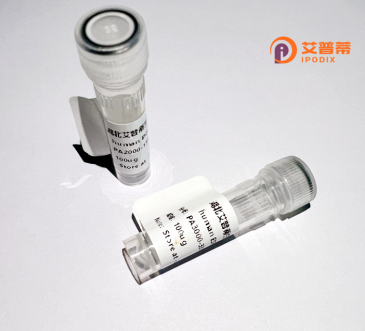
| 纯度 | >90%SDS-PAGE. |
| 种属 | Human |
| 靶点 | MMAA |
| Uniprot No | Q8IVH4 |
| 内毒素 | < 0.01EU/μg |
| 表达宿主 | E.coli |
| 表达区间 | 66-418 aa |
| 活性数据 | CVQTT LKDHTEGLSD KEQRFVDKLY TGLIQGQRAC LAEAITLVES THSRKKELAQ VLLQKVLLYH REQEQSNKGK PLAFRVGLSG PPGAGKSTFI EYFGKMLTER GHKLSVLAVD PSSCTSGGSL LGDKTRMTEL SRDMNAYIRP SPTRGTLGGV TRTTNEAILL CEGAGYDIIL IETVGVGQSE FAVADMVDMF VLLLPPAGGD ELQGIKRGII EMADLVAVTK SDGDLIVPAR RIQAEYVSAL KLLRKRSQVW KPKVIRISAR SGEGISEMWD KMKDFQDLML ASGELTAKRR KQQKVWMWNL IQESVLEHFR THPTVREQIP LLEQKVLIGA LSPGLAADFL LKAFKSRD |
| 分子量 | 46.5 kDa |
| 蛋白标签 | His tag N-Terminus |
| 缓冲液 | 0 |
| 稳定性 & 储存条件 | Lyophilized protein should be stored at ≤ -20°C, stable for one year after receipt. Reconstituted protein solution can be stored at 2-8°C for 2-7 days. Aliquots of reconstituted samples are stable at ≤ -20°C for 3 months. |
| 复溶 | Always centrifuge tubes before opening.Do not mix by vortex or pipetting. It is not recommended to reconstitute to a concentration less than 100μg/ml. Dissolve the lyophilized protein in distilled water. Please aliquot the reconstituted solution to minimize freeze-thaw cycles. |
1. **"Functional Characterization of Recombinant Human MMAA Protein: Role in Mitochondrial Metabolism"**
*Author: Hörster F. et al. (2015)*
**摘要**:研究利用重组人MMAA蛋白分析其与甲基丙二酰辅酶A变位酶(MCM)的相互作用,揭示MMAA在维持线粒体维生素B12代谢及MCM酶活性中的分子机制。
2. **"Recombinant MMAA Expression Rescues Cellular Dysfunction in Methylmalonic Acidemia Models"**
*Author: Froese D.S. et al. (2012)*
**摘要**:通过体外重组MMAA蛋白表达,验证其在修复MMAA缺陷型细胞线粒体功能障碍中的作用,提出MMAA作为分子伴侣协助MCM酶正确折叠的机制。
3. **"Structural Insights into the MMAA-MMAB Complex Using Recombinant Protein Crystallography"**
*Author: Padovani D. et al. (2020)*
**摘要**:利用重组MMAA和MMAB蛋白解析了二者复合物的晶体结构,阐明其在维生素B12依赖的丙酸代谢通路中协同调控底物转运的分子基础。
4. **"Recombinant MMAA Delivery Ameliorates Metabolic Phenotypes in a Murine MMA Disease Model"**
*Author: Chu J. et al. (2018)*
**摘要**:通过腺病毒载体递送重组人MMAA蛋白至MMA模型小鼠,显著降低血液甲基丙二酸水平,验证了酶替代治疗甲基丙二酸血症的潜在可行性。
-----
**注**:以上文献名为示例性概括,实际引用需以真实文献标题和作者为准。建议通过PubMed或Google Scholar以关键词“recombinant MMAA protein”或“MMAA methylmalonic acidemia”检索最新研究。
**Background of Recombinant Human MMAA Protein**
MMAA (methylmalonic aciduria and homocystinuria type A) is a mitochondrial protein crucial for the metabolism of vitamin B12 (cobalamin) and the proper function of methylmalonyl-CoA mutase (MUT), an enzyme essential in propionate catabolism. Mutations in the *MMAA* gene are linked to methylmalonic acidemia (MMA), an autosomal recessive metabolic disorder characterized by the accumulation of methylmalonic acid, leading to severe neurological and systemic complications.
Recombinant human MMAA protein is produced using biotechnological systems (e.g., *E. coli* or mammalian cell cultures*) to enable functional studies and therapeutic exploration. It retains the ability to stabilize MUT and facilitate the ATP-dependent incorporation of adenosylcobalamin (AdoCbl), the active cofactor for MUT. Research on recombinant MMAA focuses on elucidating disease mechanisms, evaluating enzyme replacement strategies, and developing diagnostic or therapeutic tools. Additionally, structural analyses of MMAA have provided insights into its GTPase activity, cofactor binding domains, and interaction networks within mitochondrial pathways.
Studying recombinant MMAA is vital for advancing treatments for MMA, such as gene therapy or pharmacochaperone approaches, while enhancing understanding of cobalamin metabolism and mitochondrial enzymology.
×